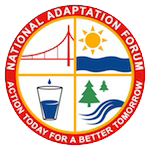Introduction
In developing the 2nd Biennial California Adaptation Forum, we the Forum organizers –a diverse committee of state, regional, and local stakeholders – felt it was important to define an overarching vision for moving adaptation action forward in our local communities and across the state. This vision has been distilled into a set of core guiding principles that encompass a practical framework for action. This framework is not intended to be a long-standing or fixed statement, but rather serves as a working compass for orienting us towards the most strategic and meaningful actions we can take in the near-term. We offer these principles in the form of the following “Adaptation Action Framework” to all Forum attendees to better understand the outlook that underlies this whole event, and also for your consideration and use in your own work.
Preamble
Climate change is happening now, and is expected to accelerate in the years ahead. Although California is at the forefront of global climate action to reduce global warming and ocean-souring emissions, reducing our risks and increasing our resiliency to the changes ahead will require an unprecedented degree of cooperative action throughout California starting now. Therefore, we believe that:
- Actions to increase resiliency and reduce risk must prioritize the health and safety of all Californians, especially our most vulnerable, while also supporting the well-being of our economy and natural systems.
- Taking action will require partnerships at all levels – from grassroots to state leadership, integrated across all sectors
- Federal, state, regional and local policies that reduce our risks and increase our resiliency should be prioritized.
- Public dollars, as well as private, should prioritize investments that reduce our risks and increase our resiliency
- Accounting for climate change risks and impacts should be institutionalized as standard practice for both the public and private sectors.
Action Areas
We agree that in order to realize this vision, we need to keep these three primary areas of action – people, infrastructure and the built environment, and natural systems – in the forefront of our individual and collective adaptation efforts. We further recognize that these three action areas are inextricably interwoven. Therefore, we will strive to achieve multiple, cross-sector benefits, and assess the interactions that choices in one area might have on the others.
- People: Adapting to climate change is fundamentally about protecting people. We agree to pursue strategies that can be measured by the degree to which they improve the safety, health and well-being of people, especially vulnerable populations.
- Infrastructure and the Built Environment: Infrastructure should be built, rebuilt and/or retrofitted with climate change in mind. We agree to pursue infrastructure investments that take into account climate science so as to prepare for conditions 100 years in the future.
- Natural Systems: We believe that healthy ecosystems are essential to the success of adaptation efforts, community vitality and prosperity in general. We agree to pursue both protection and valuation of ecosystem services, from fresh water and clean air to climate regulation and recreation, in our response efforts.
Process Guidelines
As adaptation is an emerging practice that will take many forms over time, we agree that the following process guidelines should be considered when selecting, developing and implementing adaptation initiatives:
- Empower All Sectors and Levels of Leadership: We will empower action by establishing and/or expanding traditional and non-traditional alliances and networks to accelerate effective and durable problem-solving (e.g., between/among community members and community leaders, public and private resource managers, scientists, decision-makers); share knowledge openly and actively; convey hope; regularly engage the public on the science as well as solutions; and build local community action. This includes building horizontal linkages (peer to peer) and vertical linkages (across levels of leadership) to ensure economies of scale and consistency of effort.
- Design For Multiple Benefits: To achieve success, we need to design our actions to work on multiple scales and to realize multiple benefits (not just single needs or single processes, e.g., carbon storage). This includes combining adaptation with mitigation activities to optimize the co-benefits.
- Embrace an Uncertain Future: We recognize that uncertainty is a factor and climate change adaptation is an iterative process that should be informed on an ongoing basis. We will utilize the best available science and look across multiple plausible scenarios to define measures and indicators that are adaptive and flexible. We will regularly monitor, reassess and apply learning from what works and what doesn’t to improve outcomes in a rapidly changing world.


